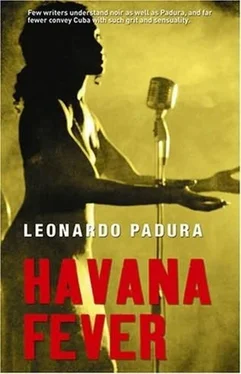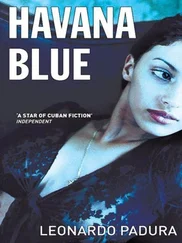Leonardo Padura - Havana Fever
Здесь есть возможность читать онлайн «Leonardo Padura - Havana Fever» весь текст электронной книги совершенно бесплатно (целиком полную версию без сокращений). В некоторых случаях можно слушать аудио, скачать через торрент в формате fb2 и присутствует краткое содержание. Жанр: Триллер, на английском языке. Описание произведения, (предисловие) а так же отзывы посетителей доступны на портале библиотеки ЛибКат.
- Название:Havana Fever
- Автор:
- Жанр:
- Год:неизвестен
- ISBN:нет данных
- Рейтинг книги:3 / 5. Голосов: 1
-
Избранное:Добавить в избранное
- Отзывы:
-
Ваша оценка:
- 60
- 1
- 2
- 3
- 4
- 5
Havana Fever: краткое содержание, описание и аннотация
Предлагаем к чтению аннотацию, описание, краткое содержание или предисловие (зависит от того, что написал сам автор книги «Havana Fever»). Если вы не нашли необходимую информацию о книге — напишите в комментариях, мы постараемся отыскать её.
Havana Fever — читать онлайн бесплатно полную книгу (весь текст) целиком
Ниже представлен текст книги, разбитый по страницам. Система сохранения места последней прочитанной страницы, позволяет с удобством читать онлайн бесплатно книгу «Havana Fever», без необходимости каждый раз заново искать на чём Вы остановились. Поставьте закладку, и сможете в любой момент перейти на страницу, на которой закончили чтение.
Интервал:
Закладка:
From then on the omnipotent Carmona specialized in buying and selling books that could fetch healthy prices in European and North American auctions. He would be visited at home, almost daily, by desperate owners of family relics that had survived previous earthquakes, now eager, at the very least, to hear decent estimates for their books, furniture and adornments, and, along the path he’d cleared for them, by the most serious buyers who’d come to the island in search of the young girls in blossom only Carmona could confidently supply.
Years in the catacombs of business had turned Pancho Carmona into a vademecum colleagues consulted to get their bearings in terms of prices, and the possible existence, whereabouts and potential sources of supply or sale. As a genuine specialist, this bookseller only offered advice on the three days of the week he worked in the plaza de Armas, and charged his colleagues a modest, set fee: an invitation to a coffee on the terrace of La Mina restaurant, down a side street leading from the plaza de Armas.
“One coffee and two beers,” Yoyi Pigeon ordered when they’d sat down at the table nearest the entrance. From there Pancho could keep a watchful eye on his stall that was being looked after by his nephew whose job it was to set up and to take the books back at the end of the day to his house on calle Amargura where belying that street name he at least had little reason to feel bitterness.
“The coffee’s for me, Lento,” Pancho told the waiter to avoid the torture of an over-watery infusion. “We’ve not seen you for a while, Conde,” he said, lighting the cigarette he always started to smoke before drinking coffee.
“Trade’s going downhill, Pancho. It’s very hard to find the necessary-”
“Yes, it’s getting hard. There’s nowhere to mine any more. Tutto è finito ,” he agreed, but Pigeon euphorically interrupted his lamentation.
“Well, Conde’s found a little gold mine.”
“Really?” responded Pancho, long since immune to rushes of excitement.
“How do you fancy a first edition of Voltaire’s Candide ?” Pigeon exclaimed. “Or a Las Casas from 1552, or The Inca’s La Florida from 1605, and Valdés’s History of the Island of Cuba ? And how about the thirteen volumes of Ramón de la Sagra’s History , all shiny and new, with all the illustrations intact?…
The gleam in Pancho Carmona’s eyes expanded at the mention of each title and he finally blurted out: “Fuck! When do I get a list of what you’ve got?”
“Nothing Pigeon just referred to is for sale,” interjected the Count. “We’ve got other things to interest you-”
“Within the week,” retorted Pigeon, ignoring his partner’s murderous looks. “When I say it’s a mine…”
“See if you can find a copy with illustrations intact of The Book of Sugar Mills and the 1832 edition of Heredia’s poetry. I’ve got a buyer who’s desperate for them and he’ll pay the asking price without protesting… I’ll seal the deal for ten percent.”
“What might the Heredia fetch then?” enquired the Count.
“That edition, the most complete and set by Heredia himself, now fetches upwards of a $1,000 in Cuba. Abroad… 3,000 plus. And if it’s signed… So, where the hell did you find this library?”
Pigeon smiled, glanced at the Count and then at Pancho.
“What’s the look on my face telling you, Panchón?”
The other smiled as well.
“I get you. When among sharks…”
“The only problem is that this fellow doesn’t want to get his fingers dirty.” said Yoyi pointing at the Count.
“And never did want to,” the Count retorted, pouring the icecold beer into his glass.
“Come on, Pancho, give him a reason to change his mind,” pleaded Pigeon and the bookseller smiled.
“To change his mind or give himself a heart attack?… How about this then: guess what I flogged the other day?” he lowered his voice. “Both volumes of the 1851 and 1856 first edition of Felipe Poey’s Reminiscences on the Natural History of the Island of Cuba … with the ex libris of Julián del Casal.”
“You’re kidding?” Yoyi reacted in shock. “How much?”
“Two thousand green ones, I didn’t want any hassle…” and he smiled, lifting his coffee to his lips.
“So where did you fish that out from?” the Count enquired.
Pancho shook his head at the naivety of the question.
“Fine… fine… what goes around comes around.”
“Anyway you bring your list, I’m sure we can do business.”
“What do you do with all that cash, Pancho?” Yoyi continued, intrigued, and unable to hide his admiration.
“That’s not for public consumption, my boy. But I dream: I dream I will have a real bookshop one day, with lots of books, lots of light, a café at the back, I see myself sitting there, like a pasha, with my coffee, my cigarette, recommending books… While I’m waiting for that dream to come true, I’ll sell from my front room and that wooden stand you see over there.”
“I want to be like you when I’m older, Panchón, I swear I do,” Pigeon declared and the Count knew this they weren’t empty words.
“OK, that’s enough bullshit,” the Count interjected. “Pancho, can you tell me anything about a single called Be gone from me . I think it’s a 78…”
“It’s a 45, by one Violeta del Río. The Gema company recorded it in 1958 or at the beginning of 1959, I think. Be gone from me on one side, by the Expósito brothers, and on the other You’ll remember me , by Frank Domínguez. I used to have a copy and it took a while to get rid of it.”
As he listened to the description of a record that finally assumed some kind of physical reality, the Count felt unexpectedly jubilant, as if Pancho Carmona had breathed vital life into his strange quest for knowledge.
“Did you ever listen to it?” he asked.
“No, I never felt like listening…”
“Who did you sell it to?”
“I don’t remember right now…”
“Of course you remember, think for a moment.”
“Lento, another coffee,” Yoyi anticipated. “And it’s for Pancho. And two more lagers…”
Pancho lit up another cigarette.
“What about the singer? What was she like?” Conde asked anxiously, lifting his smoke to his lips.
“Not the faintest fucking idea. I never knew anything about her… I got my hands on the record about fifteen years ago… Let’s see,” and Pancho Carmona shut his eyes, so he could see, he claimed: perhaps he was reading the lists of purchases and sales engraved on his brain. Finally, he raised his eyelids. “Got it, I sold it in a job-lot to the blind guy who writes about music…”
“Rafael Giró?”
“That’s your man…”
“What else do you know about the singer, Pancho?”
“Zilch. Or do you reckon I should know all there is to know about everything?”
“For two one-dollar coffees you might dredge a bit more up?” said Conde, slapping the shoulder of the oracle of calle Amargura, the man who dreamt of owning a fantastic bookshop where they’d also sell the best coffee in Havana.
That Chevrolet, the four-door, pillarless Bel Air model, manufactured in 1956 was considered by experts to be one of the most “macho” cars ever to roll along Havana’s ravaged streets. Driving it, gently pushing the horizontal gear lever, listening to that melodious combination of speed and power, feeling it slide along, robust, confident and proud, welcoming the breeze blowing through windows broad as an ecstatic smile, represented for Yoyi Pigeon the sensation closest to an erotic climax he’d ever experienced.
When Yoyi bought it two years ago, that Bel Air 56 was already a striking automobile, thanks to its classically distinguished lines and immaculate chroming, as a result of always being kept in a garage. It came into the newly graduated engineer’s possession, thanks to the $7,000 he’d earned from a sale of a Goya painting that easily changed hands and flew off to an unknown destination. His uncle, the most renowned mechanic specializing in that brand of car – about to be dubbed Paco Chevrolet in Havana – focused his much-prized wisdom on converting his nephew’s car into a holy relic on wheels. He tuned the engine in an attempt to maximize its horse-power, fitted it out with genuine spare parts, and added filters, carburettors and sensors to enhance its mechanical refinement and purring efficiency as a perfect piece of engineering, created for eternity. Then, the body-work was sandpapered to the tinplate, giving it a dazzling sheen when the car was repainted with the special metallic glow paint recommended by Ferrari, in a combination of sky blue for bonnet, boot, mudguards and doors, and brilliant white for the roof and the wedge-shaped side panels. The final elegant touch was achieved by halogenous headlights from Miami and white Firestone tyres from Mexico, so that this 1956 Bel Air Chevrolet was probably more magnificent than the one that emerged long ago from the automotive plant in Detroit, when its manufacturers could never have imagined that fifty years later it would still be the most beautiful, well-balanced, glamorous car that had ever rolled over the Earth.
Читать дальшеИнтервал:
Закладка:
Похожие книги на «Havana Fever»
Представляем Вашему вниманию похожие книги на «Havana Fever» списком для выбора. Мы отобрали схожую по названию и смыслу литературу в надежде предоставить читателям больше вариантов отыскать новые, интересные, ещё непрочитанные произведения.
Обсуждение, отзывы о книге «Havana Fever» и просто собственные мнения читателей. Оставьте ваши комментарии, напишите, что Вы думаете о произведении, его смысле или главных героях. Укажите что конкретно понравилось, а что нет, и почему Вы так считаете.











